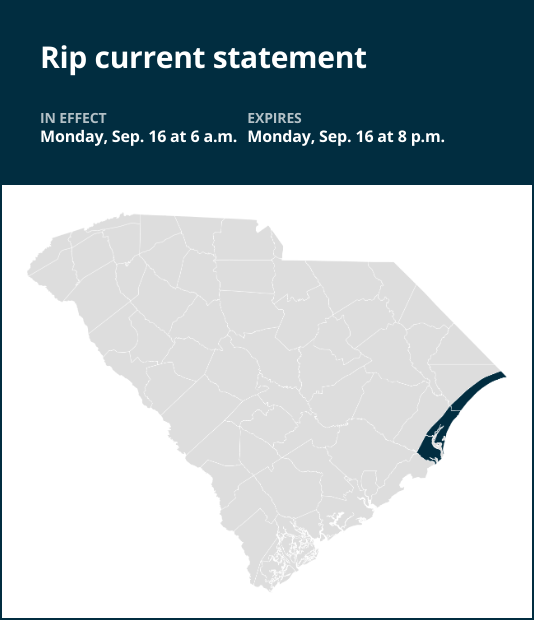The National Weather Service issued an updated rip current statement at 2:28 p.m. on Monday in effect until 8 p.m. for Horry and Georgetown counties.
“Vulnerable causeways to and from local beaches may experience minor coastal flooding. Low-lying roads and locations along the Intracoastal Waterway and adjacent tidal creeks may observe minor coastal flooding. Check with local officials for the latest information regarding coastal flood impacts and closures. Dangerous swimming and surfing conditions and localized beach erosion. Rip currents can sweep even the best swimmers away from shore into deeper water,” says the weather service. “If travel is required, allow extra time as some roads may be closed. Do not drive around barricades or through water of unknown depth. Take the necessary actions to protect flood-prone property. Inexperienced swimmers should remain out of the water due to dangerous surf conditions. Swim near a lifeguard. If caught in a rip current, relax and float. Don’t swim against the current. If able, swim in a direction following the shoreline. If unable to escape, face the shore and call or wave for help.”
This statement is in effect until 8 p.m.

Navigating rip currents: Your survival manual
Rip currents, swift channels of water flowing away from the shore at surf beaches, can turn a day at the beach into a dangerous situation. Understanding how to respond when caught in one is crucial. The weather service offers these life-saving tips:
Keep your cool – they won’t drag you under:Your first rule of thumb: Keep a clear head. Rip currents won’t pull you beneath the water’s surface. Panic is your enemy; it depletes precious energy needed for your survival.
Don’t swim against the current:Trying to swim directly toward the beach when caught in a rip current is futile and exhausting. The current is too strong. Instead, swim parallel to the shore and away from the rip current’s grip.
Signal for help if necessary:If you find yourself unable to reach the shore, try to relax. Turn to face the shore, tread water, and signal for help by shouting or waving your arms. This increases your visibility to potential rescuers.
Seek lifeguarded beaches for added safety:Whenever feasible, choose beaches with lifeguards on duty. Their trained eyes and rapid response can be a lifesaver in water emergencies.
Never brave the waves alone on unguarded shores:If you choose to swim at beaches without lifeguards, make it a rule never to swim solo. Always bring a friend, and ensure that person has a cell phone to call 911 in case of an emergency.
Rip currents are formidable natural forces, but knowing how to react can significantly increase your chances of safely navigating these challenging waters. Stay informed, stay vigilant, and prioritize safety when enjoying the surf.






